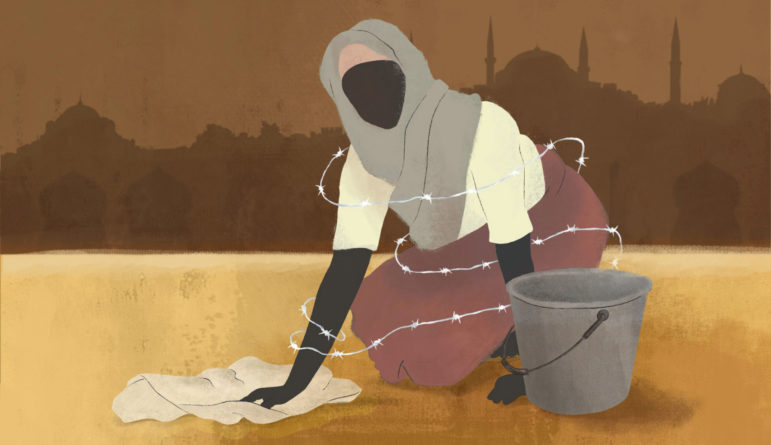

Illustration: Marcelle Louw for GIJN
Chapter 10 – Reporting Guide for Bahrain
Read this article in
Chapter Guide Resource
Introduction: GIJN Guide to Reporting on Migration in the Gulf Arab Countries
Chapter Guide Resource
Chapter 1 – Best Practices and Suggested Topics in the COVID Era
Chapter Guide Resource
Chapter 2 – COVID-19 and Migrant Workers in the Gulf
Chapter Guide Resource
Chapter 3 – Statistics and Studies
Chapter Guide Resource
Chapter 4 – Essential Reading
Chapter Guide Resource
Chapter 5 – Experts Guide
Chapter Guide Resource
Chapter 6 – Trafficking Case Studies
Chapter Guide Resource
Chapter 7 – First-Hand Reporting Accounts
Chapter Guide Resource
Chapter 8 – Key Terms
Chapter Guide Resource
Chapter 9 – Trafficking and Forced Labor Glossary
Chapter Guide Resource
Chapter 10 – Reporting Guide for Bahrain
Chapter Guide Resource
Chapter 11 – Reporting Guide for Kuwait
Chapter Guide Resource
Chapter 12 – Reporting Guide for Oman
Chapter Guide Resource
Chapter 13 – Reporting Guide for Qatar
Chapter Guide Resource
Chapter 14 – Reporting Guide for Saudi Arabia
Chapter Guide Resource
Chapter 15 – Reporting Guide for United Arab Emirates
Media Environment
The Bahraini constitution guarantees freedom of expression and the press, excluding opinions that undermine the fundamental beliefs of Islam or the “unity of the people” and those that promote “discord or sectarianism.” However, the Law of Press, Printing, and Publishing of 2002 is used to restrict free speech; Law 47/2002 includes 17 categories of offenses, three of which allow for prison sentences. Several articles in Bahrain’s Penal Code are also used to restrict freedom of expression in the country, including Article 216 of the Code, which criminalizes anyone who “offends” government institutions and authorities. Bahrain passed a Press and Media Law that the Bahraini Press Association called out because it contained “blatant restriction on the freedom of press.” In April 2021, the Bahraini cabinet amended the draconian law to mitigate some of its harshest measures and abolish its provision for the jailing of journalists.
The climate around freedom of expression in Bahrain has changed significantly since 2011, when protests influenced by the Arab Spring erupted. The Bahraini authorities responded by prosecuting journalists and critics that covered political events or reflected the voices of protesters and voices of dissent. In 2017, Bahraini authorities arrested, summoned, and took legal actions against individuals who criticized the Chamber of Commerce, members of Parliament, the Ministry of Information Affairs, the Council of Representatives, the rule of law, historical religious figures, and the Bahraini king. In 2020, the government stepped up its crackdown on dissent to even include members of parliament, prohibiting them from criticizing anything that is deemed by the government to “harm the supreme interests of the country.” The government has also fined and arrested several activists in 2020 for criticizing Bahrain’s normalization policy with Israel.
After the suspension of the Arabic daily newspaper Al Wasat in 2017, there have been no independent daily media newspapers in Bahrain. All existing newspapers, radio, and television stations broadcast official views or practice self-censorship in covering news. Social media platforms, such as Twitter, are among the few places to obtain independent news and critical views about events and policies in Bahrain.
Foreign correspondents must obtain a license to be renewed every year by the Ministry of Information Affairs. This license can be revoked for publishing news that involves “exaggeration, fabrication, deception, or distortion.” Bahrain requires international media correspondents and staff to register for a media visa through the Ministry of Information Affairs ahead of their visit, those who apply for media visa or press permits must be careful as they may be under the government’s radar and surveilled upon.

Bahrain was ranked 168th in the Reporters Sans Frontières 2021 World Press Freedom Index. Image: Screenshot
Due to ongoing suppression of press freedom, Bahrain was ranked 168th in the 2021 World Press Freedom Index, lower than every other Middle East and North Africa (MENA) nation except Yemen (169th) and Saudi Arabia (170th).
Reporting on Migration Issues
There are no clear rules to anticipate whether you might be targeted for reporting on trafficking topics in Bahrain. It depends on the mood of the official seeing your story. Usually, authorities are easygoing about non-political issues, unless it affects a high-profile person.
Regardless, you’ll need to prepare a comprehensive plan before attempting your investigation, taking into consideration the current political scene, a digital security plan, escape routes, backing up data and media, finding sources, and organizing interviews. Here are some additional recommendations:
- Research the possibility of government surveillance and plan for a secure way to communicate with the individuals you will meet and those who you will exchange files with.
- Monitor how media outlets in Bahrain cover the topic you want to write about and try to connect with journalists who have written stories about migrant workers and seek their advice.
- Demonstrations and protests are a regular occurrence in Bahrain. Avoid going to political events as photographers and journalists have been attacked, arrested, interrogated, or had their equipment confiscated.
Finding and Pursuing Stories
Finding migrant workers willing to speak to the press can be done in different ways.
Social Clubs and Churches
There are several social clubs in Bahrain that are run by different migrant communities that allow journalists to interview migrant workers. Churches are also places where many migrant workers from different backgrounds, sometimes including domestic workers, meet and socialize. Be sure to remain respectful of their place of worship, and keep in mind that people are there to socialize or pray, and otherwise may not want to speak to journalists about their issues.
NGOs
Reaching out to NGOs and civil society groups that work with migrant workers is key to understanding the on-the-ground reality for migrants in Bahrain.
- Migrant Workers Protection Society
- The General Federation of Workers Trade Unions in Bahrain
- Indian Relief Community Fund
- Bahrain Center for Human Rights
Government
-
- Labour Market Regulatory Authority and social media accounts.
- Expat Protection Centre and National Committee on Combating Trafficking in Persons.
Committee members are appointed by the Minister of Foreign Affairs; two members of the committee are from Bahrain’s civil society and can be easier to approach than other government officials. - Ministry of Labor and Social Development.
- Police Department of the Ministry of the Interior. Note that police officers will often not speak to journalists who do not work for an accredited media outlet or have a permit from the Ministry of Information Affairs.
- Ministry of Justice and Islamic Affairs.
- Public Prosecutor’s Office.
- Dar Al Aman Shelter and Child Protection Center.
- “Tawasul” app. The national suggestions and complaints system can be used to reach out to government entities for inquiries about specific policies or procedures.
Embassies of Origin Countries
- Embassy of India
- Embassy of Bangladesh
- Embassy of Pakistan
- Embassy of the Philippines
- Embassy of Sri Lanka
Other Suggestions
- Going to Bab el-Bahrain Souk on Fridays. This local market in the capital city is where many migrant workers enjoy their day off.
- Visiting industrial areas of Bahrain such as areas in Al Hidd and Sitra, where many labor camps are located.
- Visiting cosmopolitan neighborhoods of Manama such as Gudaibiya, which is home to a large number of migrant communities and businesses from Asia and Africa.
- Lawyers that deal with labor disputes for migrant workers in court can be helpful. The website of the US embassy in Bahrain provides a list of all lawyers, along with their area of practice and contact information. NGOs mentioned above work closely with lawyers that deal with labor disputes and have extensive knowledge about the issues and legal challenges facing migrant workers.
Interviews and Meetings
Government
In Bahrain, there is no law that guarantees a right to information, so public government data is often scarce, sometimes leaving no option but to approach government officials directly for information.
There are no clear rules on the best method to approach a government official, but it’s better to understand the hierarchical structure in his/her department and go through the right channels.
You will be asked to send an official request through fax or email explaining the reasons why you want to book a meeting, the nature of your work, and the organization you represent. Try to book the meeting at least three months in advance, and expect a delay in hearing back and getting a confirmation due to bureaucratic processes. During that time, keep following up to ensure that the meeting is booked and confirmed. Sometimes officials will ask you to send the questions in advance before the meeting, so they might answer the questions through email instead of meeting directly. This has become the norm with the COVID-19 pandemic.
It is common to hear the phrase “we didn’t get your email or your fax” even if you sent it to the right address. Government websites are not updated regularly, so it’s better to call the department and ask about their preferred method of communication, and to make sure to get a confirmation about receiving your letter.
Keep in mind that officials like to meet with journalists if they think that the story will highlight the achievement of their department. If they get the impression the story might be critical of the government in any way, you might hear the word “inshallah” — “God willing” or “if God wills it”– as a response to your questions about the meeting. This can be a diplomatic way of refusing your request for a meeting.
If you do get the meeting, show up on time, but don’t get frustrated if there is a delay, or if you notice that there are many interruptions during the meeting with staff coming in asking for signatures or phone calls being answered. It’s not a sign of disrespect, but Bahrainis are usually relaxed, easygoing, and not strict about time.
Keep in mind that Bahrain also passed a law in 2020 that prevents public sector employees from criticizing any government policies, so be careful when attributing quotes.
Migrant Workers
Some tips when planning to meet migrant workers include:
- Have the interviewees selected by a spokesperson or community leader.
- Meet three or four workers, maximum, at a time. Meeting more could attract attention.
- Always protect your sources and their anonymity.
- If an issue is particularly sensitive, avoid having your name appear on reports or publish with a non-local media group.
- The location of the meeting could be a local coffee shop mostly visited by migrant workers (such as Indian delis in Manama souq). Avoid fancy places if you want to keep a low profile.
- In labor camps, spend as little time as possible inside to prevent other migrants getting scared — which happens most of the time — and reporting your visit to the guards, who will alert top management. The time frame also needs to be cut shorter if you’re a female reporter in all-male accommodation, as it might attract more attention. If you have to use cameras in the camps, it’s best to have a clear idea of what exactly needs to be photographed and go straight for those shots without wasting time.
Recommended Reading
Forced Labor and Human Trafficking
-
- “I am not a business lady” (EN)
- Bahrain must not retain its Tier-1 status in TIP report (EN/AR)
- Non-payment of wages: An issue on the rise for low-income migrant workers in Bahrain (EN/AR)
- The Forgotten Farmers of Bahrain (EN/AR)
- Migrant Worker Abuse in Bahrain and the Government Reform Agenda (EN)
- Bahraini Anti-trafficking Law Incapable of Protecting Domestic Workers (EN)
- Living as Commodities: Human and Sex trafficking in the GCC (EN)
- Bahraini Officials Use Free Market Economy to Justify Lack of Minimum Wage (EN)
- Bahrain’s “Third Millennium Slavery” (EN)
- Bahrain’s National Referral Mechanism (AR)
- Wasted Rights (AR)
Free Visa
- A closer look at the Flexi-Permit two years on (EN/AR)
- The Flexi Permit Experiment: No Kafala, but poor labor practices persist (EN/AR)
- One year since launch: Has Bahrain’s Flexi-Permit lived up to its hype? (EN/AR)
- Free Visa as a Tool of Anti-Trafficking (AR)
Labor Camps
- Understanding Labor Camps in the Gulf States (EN)
- Migrants in Bahrain face an eviction crisis amid COVID-19 pandemic (EN/AR)
Archives
Books
- “Transit States Labour, Migration and Citizenship in the Gulf.” Edited by Abdulhadi Khalaf, Omar AlShehabi, and Adam Hanieh, contains an excellent collection of chapters from different angles on the topic of migration in the Gulf and the kafala system. While the book covers the Gulf region as a whole, most of the chapters are focused on Bahrain.
























